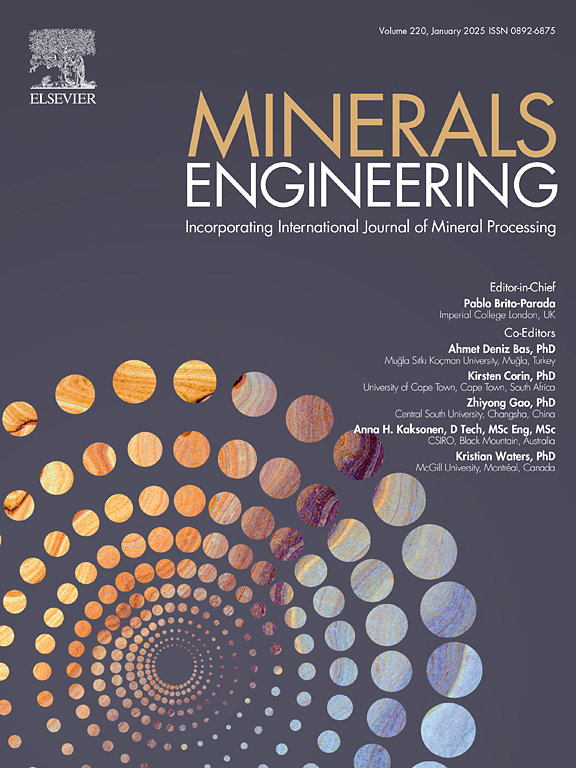Vacuum roasting to enhance the removal of muscovite from quartz by controlling the decomposition pathway
IF 4.9
2区 工程技术
Q1 ENGINEERING, CHEMICAL
引用次数: 0
Abstract
The removal of muscovite impurities from quartz ore determines the final purity of high-grade quartz sand. To improve the removal of muscovite by leaching, this study systematically investigated the effect of atmospheric roasting and vacuum roasting on muscovite decomposition pathways through thermodynamic analysis and phase characterization. The results revealed that vacuum roasting caused the muscovite to decompose according to the reaction pathway of R6 and completely decomposed into small molecular substances, significantly lowered the Gibbs free energy change (ΔG) of reaction (R6), allowing it to occur at the studied roasting temperatures. This process prevented the formation of KAlSi2O6 during roasting while facilitating the direct volatilization of potassium (K) and the transformation of aluminum (Al) into leachable Al2O3. The experimental results demonstrated that vacuum roasting significantly enhanced the leaching removal of muscovite, increasing the optimal removal ratios of Al and K to 82.7% and 98.1%, respectively, compared to 72.4% and 94.6% achieved with atmospheric roasting. This innovative vacuum roasting method provides a solution to produce high-purity quartz by removing muscovite impurities.
真空焙烧控制石英的分解途径,提高白云母的去除率
石英矿石中白云母杂质的去除决定了高品位石英砂的最终纯度。为了提高白云母的浸出效率,本研究通过热力学分析和物相表征,系统研究了常压焙烧和真空焙烧对白云母分解途径的影响。结果表明,真空焙烧使白云母按照R6的反应途径进行分解,并完全分解为小分子物质,显著降低了反应(R6)的吉布斯自由能变化(ΔG),使其能够在所研究的焙烧温度下发生。该工艺防止了焙烧过程中KAlSi2O6的形成,同时促进了钾(K)的直接挥发和铝(Al)转化为可浸出的Al2O3。实验结果表明,真空焙烧显著提高了白云母的浸出率,Al和K的最佳去除率分别达到82.7%和98.1%,而常压焙烧的最佳去除率分别为72.4%和94.6%。这种创新的真空焙烧方法提供了一种通过去除白云母杂质来生产高纯度石英的解决方案。
本文章由计算机程序翻译,如有差异,请以英文原文为准。
求助全文
约1分钟内获得全文
求助全文
来源期刊

Minerals Engineering
工程技术-工程:化工
CiteScore
8.70
自引率
18.80%
发文量
519
审稿时长
81 days
期刊介绍:
The purpose of the journal is to provide for the rapid publication of topical papers featuring the latest developments in the allied fields of mineral processing and extractive metallurgy. Its wide ranging coverage of research and practical (operating) topics includes physical separation methods, such as comminution, flotation concentration and dewatering, chemical methods such as bio-, hydro-, and electro-metallurgy, analytical techniques, process control, simulation and instrumentation, and mineralogical aspects of processing. Environmental issues, particularly those pertaining to sustainable development, will also be strongly covered.
 求助内容:
求助内容: 应助结果提醒方式:
应助结果提醒方式:


